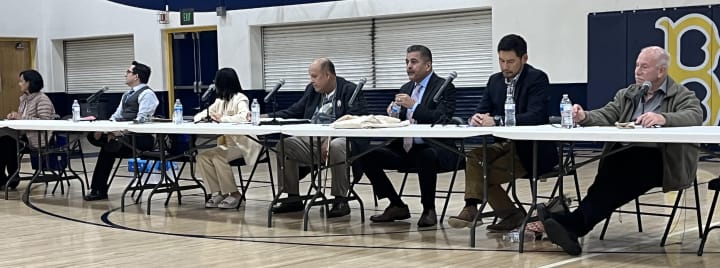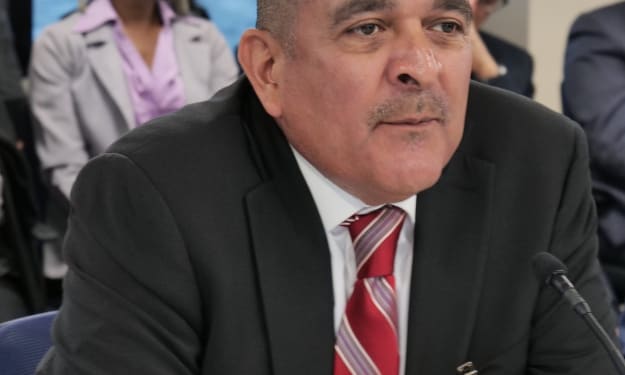Facing The Voters
In the first debate since filing closed, seven LAUSD BD3 School Board candidates answered questions from the community. One was a no-show.

“Community Schools are a road to communism.”
– BD3 Candidate Raquel Villalta
As my wife and I pulled into the parking lot of Birmingham Charter High School, we were impressed by the number of cars already present. It was a Saturday night on the first day of Thanksgiving break and spots were already scarce. Civil engagement may not be dead after all.
It turned out most of the cars were there for a different event that was occurring on the football field, but approximately 50 people did attend what was billed as a “candidate debate” hosted by the Lake Balboa and Winnetka Neighborhood Councils. Moderated by Spectrum News 1 correspondent Ariel Wesler, the event was more of a “candidate forum” than a “debate” as there was no give and take between the candidates. Whatever the classification, it did give voters the opportunity to size up the people running to represent them in the BD3 seat on the LAUSD School Board.
Of the eight candidates who are currently in the process of collecting signatures so that they can appear on the March 5, 2024, ballot, only Elizabeth Badger was a no-show for the event. Her failure to participate deprived voters of the opportunity to hear her viewpoints on a wide range of subjects regarding the future of the school district. Badger has also refused to participate in my ongoing Candidate Forum Series which has included questions about PROP-39 Co-Locations and Special Education. As a constituent of BD3, I will assume from her lack of response that she has not taken the steps necessary to improve her understanding of the issues since she ran for this same seat in the 2020 election. Her continued refusal to engage should be seen as disqualifying in the eyes of the voters.
It was clear from the audience's reaction that Raquel Villalta made the most effort to bring her supporters to the event. While they were very passionate, they and their candidate were clearly out of step with the electorate in Los Angeles. The “highlight” of her responses was a declaration that “Community Schools are a road to communism.” To be clear, these are schools that provide wrap-around services to students in impoverished neighborhoods. It is unclear how ensuring access to food and health care provides a path to class warfare and dictatorship. I would argue instead that the upward mobility and knowledge provided by an effective education diminishes the likelihood of either. Villata also claimed that ethnic studies promote division, the Black Student Achievement program discriminates against students from other groups, the COVID-19 vaccine was not studied, and that the group violently protesting LGBTQ+ inclusion at Saticoy Elementary School were the ones who were attacked.
Byron Gutierrez also seemed to have trouble understanding the purpose of community schools. He felt that implementing these programs diverts resources from where they should be focused and that the District should stick to doing what they are supposed to do. This ignores the fact that it is hard to learn when you are hungry, suffering from medical issues, or consumed with worries about family situations. To his credit, Gutierrez acknowledged that a lot of the questions involved “really difficult” subjects, but he also did not provide a lot of solutions. His business background gives him the tools to understand operational subjects like the budget, but he did not display a knowledge of how education works.
A similar lack of knowledge was shown by Andreas Farmakalidis. It was particularly surprising that he did not draw on his experience as an LAUSD vendor to explain how that would inform his ability to be a Board Member. As a professional musician, it is not surprising that Farmakalidis provided the strongest advocacy for music education. However, his explanation of why this component of education was “life-saving” was deeply offensive. The candidate says that in first grade he was pulled out of general education to receive special education services, including music classes. He claims that these lessons helped him to re-enter general education the following year and that this “saved his life,” as if being classified as a Special Education student somehow dooms one to failure.

As a teacher and testing coordinator at Granada Hills Charter School and a former lawyer, Janie Dam certainly has the experience to qualify for a Board seat, but that experience did not always translate to informed answers. Most notably, when asked about school safety, she replied first that she is opposed to guns, something that is beyond the control of the school district. She also proposed many policies that diverged from what is practiced by her employer. For example, in response to a question about the protest over LGBTQ+ inclusion at Saticoy Elementary, she stated that the LAUSD needs to do a better job at notifying parents what their opt-out rights are. However, as the testing coordinator at Granada, she directly interfered with our legal right to opt our daughter out of standardized tests. Granada has more students than at least 86% of all school districts nationwide. Perhaps Dr. Dam should help get that community’s house in order before moving on to the District.
While Dr. Dam is an employee of a charter school that says it is the biggest in the country, Dan Chang is said to be the choice of the charter school industry in this race. However, his support of privatized education was not always fully evident. The exception was his response to the question about PROP-39 when he stated that facilities need to be shared equally and that we need to make all co-locations work. Chang did have one of the strongest answers of the night when he responded to a question about Primary Promise by stating that as a School Board Member, his “job is to hold the Superintendent accountable.”
LAUSD School Principal Richard Ramos also shared the sentiment that “the Board of Education is the boss of the Superintendent.” His answers made it clear that his candidacy is focused on using education to empower students so that they can climb out of poverty. I will admit that I cringed slightly when he began his response about anti-Semitism by stating that it was rooted in the lack of hope caused by poverty, but was relieved when he summed up his thoughts with a statement that it was the job of education systems to challenge hate, challenge anti-Semitism, and challenge anti-black rhetoric. Ramos was also unique in his delivery throughout the night, standing to address the audience for each answer.
As the incumbent, it is not surprising that Scott Schmerelson showed a deep breadth of knowledge of the issues facing the District. His only surprising answer was in response to the question about school safety where he deviated greatly from UTLA and their efforts to reduce funding for the LAUSD School Police. “Only school police run to the problems while others run away” is not something one expects to hear from someone backing a social justice agenda. At times he came off as a critic of the District instead of someone who is in charge, especially when he claimed that he “has never been more disappointed than when he learned” that Jose Cole-Guiterezz had been lying for years about when the law considers a space eligible for co-location by a charter school. If Schmerelson is going to win his reelection bid, he is going to have to convince his constituents that he will be more proactive about overseeing the District’s vast bureaucracy. A Board member being “shocked” by the actions of someone over whom he is supposed to have supervisory responsibility does not inspire a lot of confidence.
As a final thought, I was very surprised that only three of the seven candidates approached me during the evening to sign their nominating petitions. This was a room full of engaged voters and perhaps the most obvious place these candidates will find to gather the signatures they will need to appear on the ballot. I signed for all three, even the one that has little chance of getting my vote. They all deserved the chance to make their case.
____________________________
A summary of each candidate’s responses can be found in the article Charter Schools, SpEd, Vaccine Mandates, and Other Answers.
____________________________
Carl Petersen is a parent advocate for public education, particularly for students with special education needs, who serves as the Education Chair for the Northridge East Neighborhood Council. As a Green Party candidate in LAUSD’s District 2 School Board race, he was endorsed by Network for Public Education (NPE) Action. Dr. Diane Ravitch has called him “a valiant fighter for public schools in Los Angeles.” For links to his blogs, please visit www.ChangeTheLAUSD.com. Opinions are his own.
About the Creator
Carl J. Petersen
Carl Petersen is a parent advocate for students with SpEd needs and public education. As a Green Party candidate in LAUSD’s District 2 School Board race, he was endorsed by Network for Public Education (NPE) Action. Opinions are his own.






Comments
There are no comments for this story
Be the first to respond and start the conversation.